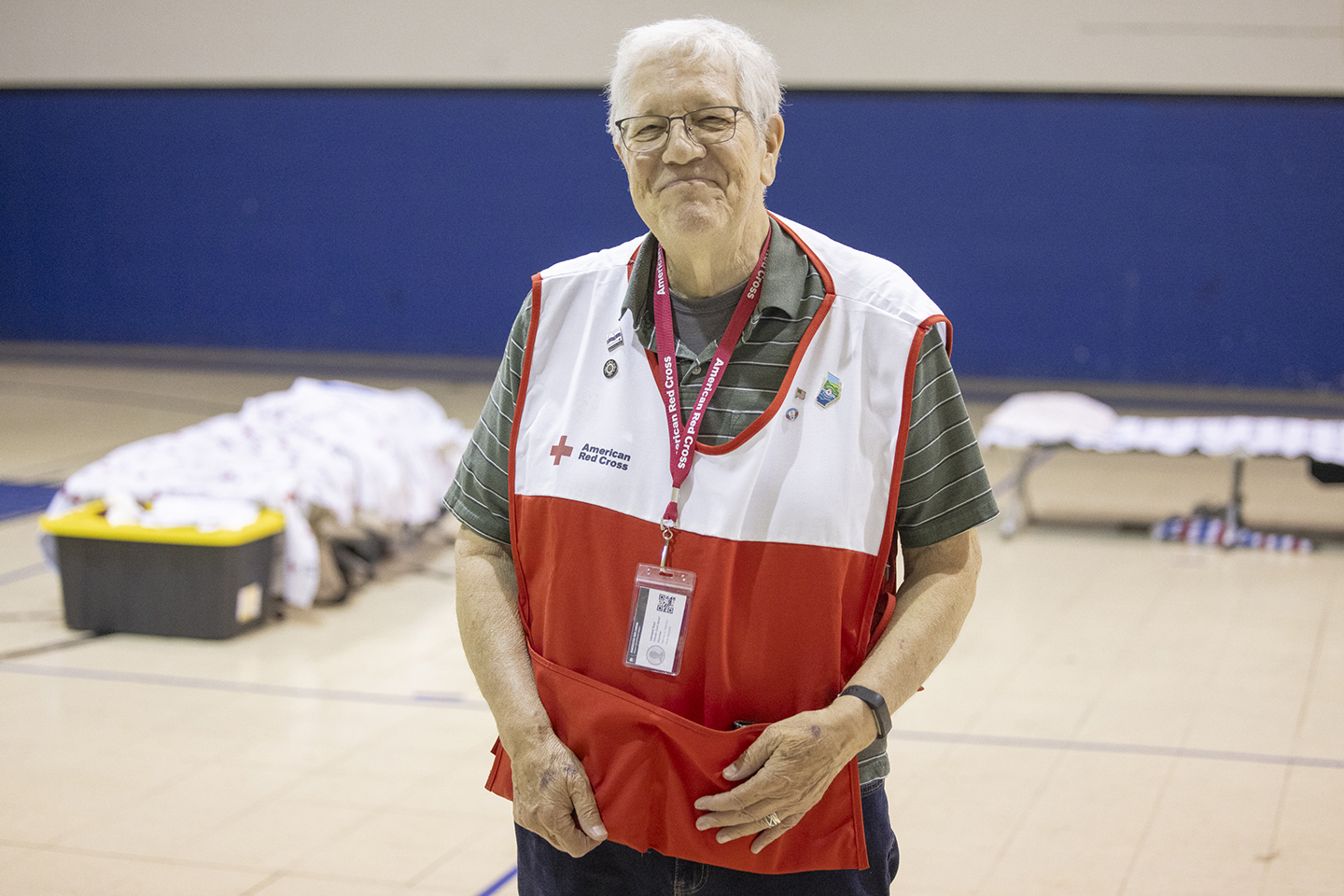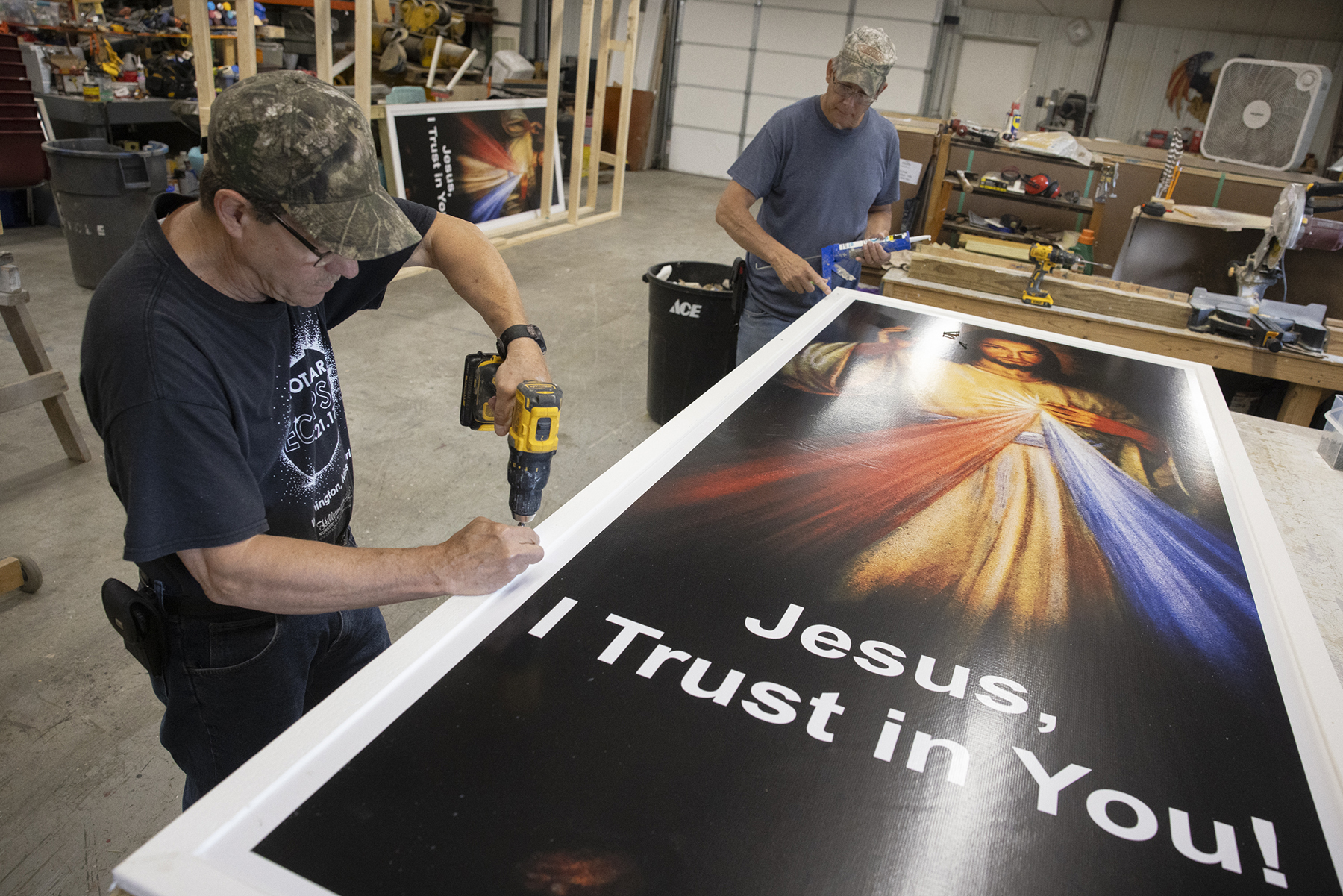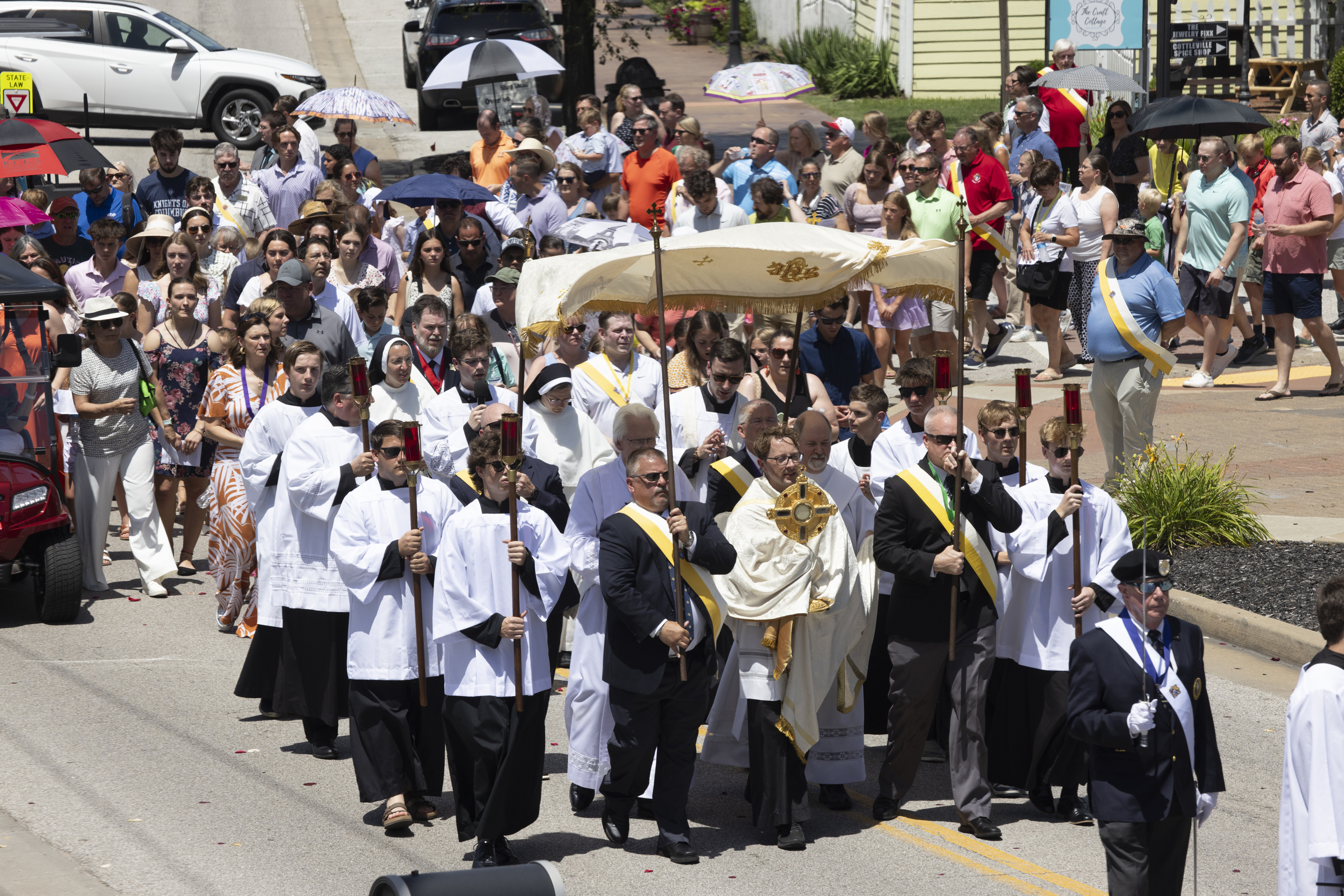Archdiocese of St. Louis, other dioceses adopt wide-ranging plans to limit spread of coronavirus
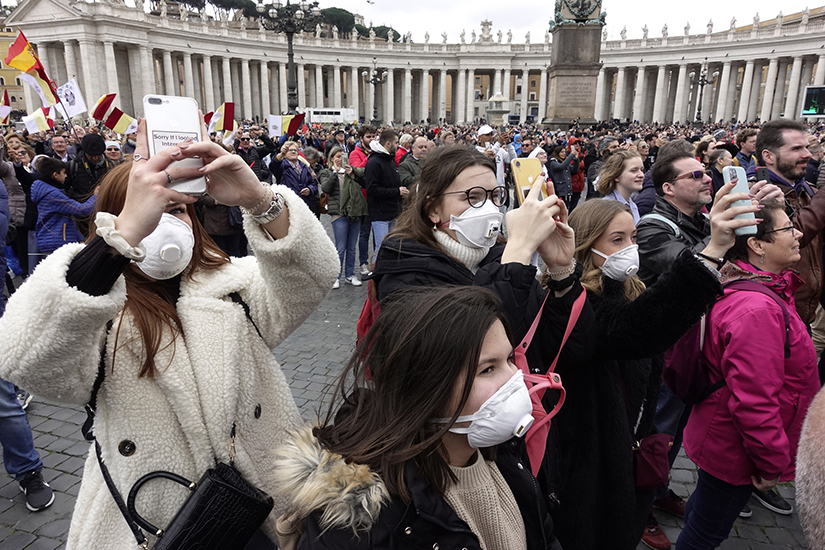
Archbishop Carlson lists precautionary steps on the spread of colds, flu, other contagious diseases
WASHINGTON — Dioceses nationwide and across Europe are taking precautions to guard against the spread of the coronavirus and reminding parishioners to practice commonsense hygiene in their personal lives.
Among the most common preventative measures being taken are urging reception of holy Communion in the hand, suspension of distribution of the Communion cup and exchanging the sign of peace without physical contact.
The Archdiocese of St. Louis announced similar recommendations. (For a full list of recommendations in the archdiocese, click here.
The U.S. Centers for Disease Control and Prevention recommends simple steps to prevent spreading the virus, such as avoiding contact, avoiding touching your face, frequent hand washing and cleaning and disinfecting surfaces frequently.
Diocesan leaders also asked people who are ill to refrain from attending Mass.
“If you are sick, stay home until you are feeling better,” Bishop David A. Zubik of Pittsburgh said in a March 2 announcement to parishioners.
Across the country, diocesan officials were implementing steps recommended by the U.S. Conference of Catholic Bishops’ Committee on Divine Worship to limit the potential spread of the illness that by March 3 had reached about 70 countries including the United States. Health officials in the U.S. have confirmed more than 100 cases of the illness in 15 states, including at least nine deaths.
Worldwide by March 3, more than 92,000 cases and more than 3,100 deaths have been attributed to the coronavirus, with most in China, the epicenter of the outbreak.
At the same time, at least one bishop urged calm as people responded to the coronavirus, designated COVID-19 by world health authorities.
“Please encourage your communities during this time of uncertainty to prepare, but not panic,” Auxiliary Bishop Joel M. Konzen, administrator of the Archdiocese of Atlanta, said in a Feb. 28 memo. He said precautions preventing the spread of COVID-19 were similar to those to prevent the spread of flu.
Like diocesan officials across the U.S., many dioceses have encouraged priests not to extend the sign of peace, distribute Communion from the cup or invite people to shake hands in greeting at Mass or other gatherings. Those who distribute holy Communion should wash their hands before Mass and clean their hands again before and after distributing Communion, he said.
Beyond those steps, the Archdiocese of Miami suggested that parishes empty the holy water fonts at church entrances, and it also is allowing extraordinary ministers of holy Communion who feel uncomfortable in carrying out their ministry to temporarily step down.
Archbishop John C. Wester of Santa Fe, New Mexico, updated liturgical practices introduced in January because of the severity of the flu season in Utah. In a March 3 statement, he mandated that holy Communion be received in the hand.
“What is important is that we receive our Blessed Lord in holy Communion,” he said. “How we receive, while very personal to the individual communicant, is not crucial. … Receiving Communion in the hand is every bit as respectful as receiving on the tongue.”
Religious site closures
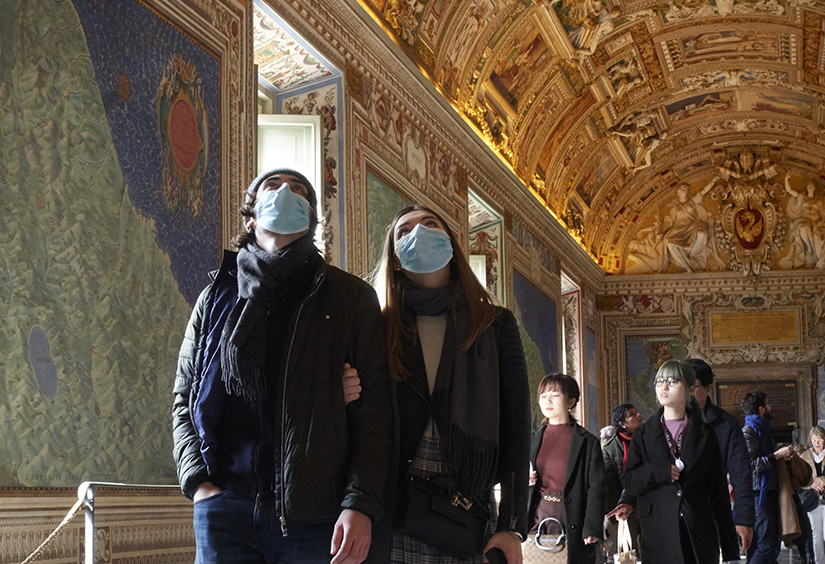
As the number of people testing positive for the coronavirus in Europe continued to grow, the French Shrine of Our Lady of Lourdes announced that pilgrims were still welcome, but the pools the sick bathe in hoping for healing would be closed temporarily.
“Our first concern will always be the safety and health of the pilgrims and the shrine’s working community,” according to a note posted Feb. 28 on the shrine’s website. “As a precaution, the pools have been closed until further notice.”
Large indoor meetings, conferences and Lenten reflections scheduled for March also were canceled or postponed, including a meeting in Assisi, Italy, March 26-28 called “The Economy of Francis.” The international gathering of young adult activists, economists, scholars and entrepreneurs to discuss creating a more inclusive economy was supposed to include a closing address by Pope Francis. The meeting has been postponed until November.
The Italian civil protection service said 1,577 people in Italy had the coronavirus as of 6 p.m. March 1. A total of 1,694 people had tested positive since the beginning of the outbreak; 83 recovered and 34 people had died. Only about one-third of those who tested positive required hospitalization; the others were being treated at home. Italy has the highest number of coronavirus cases in Europe.
Virus affecting schools
Amid concerns over the current outbreak of the coronavirus, several U.S. Catholic colleges and universities have canceled their international programs in Italy this semester or are closely monitoring the situation and prepared to cut programs short if necessary.
Saint Louis University students may participate in study-abroad programs in other locations operated by partner universities and centers. Recently, two other Jesuit universities, Spring Hill College and Loyola of Chicago, suspended programs in Italy, which has impacted 13 SLU students.
SLU had three students set to study abroad at a program in China, which was canceled in late January, and two students who were set to study abroad at a program in South Korea, which has been delayed, according to a statement from the university.
“SLU has been working with all of the students impacted by changes to these other programs,” according to SLU’s statement.
The only study program that’s operated by Saint Louis University is on its second campus in Madrid, Spain. There are no current plans to end study abroad programs at SLU-Madrid early. “We will continue to monitor and plan should circumstances change. Study abroad students there are receiving updates from the Madrid campus,” the statement noted.
SLU’s website provides the latest information on the situation at www.slu.edu/health-advisory/index.php.
Schools ending their Italian international study programs this semester include Villanova University just outside Philadelphia, the University of Notre Dame in South Bend, Indiana, Gonzaga University in Spokane, Washington, The Catholic University of America in Washington, Fairfield University in Connecticut, Loyola University Chicago, the University of St. Thomas in St. Paul, Minnesota, and Boston College.
Other colleges that are monitoring the situation for their study abroad programs include the University of Dallas and Benedictine College in Atchison, Kansas.
St. Raphael Academy in Pawtucket, Rhode Island, had to put plans into immediate action when a member of the school community tested “presumptive positive” for a strain of coronavirus after participating in a recent school trip to Italy.
The Catholic high school building was initially closed March 2-3 for sanitizing, but the school later extended this closure for the entire week, announcing on its website that “students will be instructed at home through virtual learning.” All after-school activities and sports practices also have been canceled.
On March 1, a man in his 40s who was on the February school trip and has not been identified as a member of the school’s faculty or a chaperone, was the first Rhode Islander said to have a strain of the virus.
The man, who has not been at the school since returning from the trip, is currently hospitalized. By the end of the day March 1, a student from the school, who also was on the trip, was similarly diagnosed, and by March 2, health officials said a third person, a woman in her 30s who likewise was on the trip, is undergoing tests for the coronavirus.
Recommendations from the Archdiocese of St. Louis
Archbishop Robert J. Carlson has recommended priests and deacons of the archdiocese take precautionary measures to mitigate the spread of novel coronavirus, colds, influenza and other contagious diseases.
The liturgical adaptations Archbishop Carlson recommends are consistent with other localities in the past where the outbreak of influenza has been the most significant.
Archbishop Carlson wrote that while seasonal flu is making a bigger impact, the precautionary recommendations can help protect parishioners from the spread of illness when they gather for Mass. They include:
• sanitizing all sacred vessels before and after all Masses (with soap and hot water), because germs may survive on surfaces up to 24 or more hours.
• suspending the exchange of the sign of peace (or instructing that it be exchanged without physical contact).
• advising parishioners to keep a distance of three feet from the nearest neighbor when possible.
• sharing reminders that Holy Communion is encouraged to be received in the hand.
• suspending the distribution of Holy Communion to the faithful via the chalice.
• sanitizing the holy water fonts once a week with the holy water being poured out on the ground.
• encouraging good hygiene, including alcohol-based hand sanitizer lotion in restrooms and public areas, and proper cough-and-sneeze etiquette. It is especially important for extraordinary ministers of Holy Communion to implement these measures.
• reminding the elderly — who are among the most vulnerable — that they have the option to participate in the Mass on television via channels such as EWTN, and to request that Holy Communion be brought to their place of residence.
• helping identify those who are more at risk (such as elderly people living alone, persons with disabilities, children and teens) and check on them;
• encouraging people with a respiratory infection, the flu, a fever or a serious cold to stay home and be reassured that they are not bound to attend weekend Mass.
Missouri Gov. Mike Parson addressed the state’s readiness on coronavirus on March 3. The state Department of Health and Senior Services has further information on its website at www.health.mo.gov.
Recommendations from the CDC
There is currently no vaccine to prevent coronavirus disease 2019 (COVID-19). The best way to prevent illness is to avoid being exposed to this virus. However, as a reminder, CDC always recommends everyday preventive actions to help prevent the spread of respiratory diseases, including:
- Avoid close contact with people who are sick.
- Avoid touching your eyes, nose, and mouth.
- Stay home when you are sick.
- Cover your cough or sneeze with a tissue, then throw the tissue in the trash.
- Clean and disinfect frequently touched objects and surfaces using a regular household cleaning spray or wipe.
- Follow CDC’s recommendations for using a facemask.
CDC does not recommend that people who are well wear a facemask to protect themselves from respiratory diseases, including COVID-19.
Facemasks should be used by people who show symptoms of COVID-19 to help prevent the spread of the disease to others. The use of facemasks is also crucial for health workers and people who are taking care of someone in close settings (at home or in a health care facility).
- Wash your hands often with soap and water for at least 20 seconds, especially after going to the bathroom; before eating; and after blowing your nose, coughing, or sneezing.
If soap and water are not readily available, use an alcohol-based hand sanitizer with at least 60% alcohol. Always wash hands with soap and water if hands are visibly dirty.



